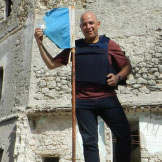
Jorge Juan Sanchez, from Barcelona, Spain, has now visited 319 countries and territories on the TCC list. Those destinations he still needs to visit to reach the 324 TCC total are Cabinda, Chagos, Antarctica/Norway, Antarctica/New Zealand and Antarctica/Australia.
When he was 18 he started traveling abroad, hitchhiking and “living like a hippie.” During two years he visited 10 Europe countries, earning money working in several places on the road. He returned to Spain in 1975 to be enrolled in the then compulsory army, and a few years later he began to travel intensively. To finance his journeys, he worked in several countries, teaching Spanish (Japan and Taiwan), or as a waiter in restaurants in New York, San Francisco, Sydney and Montreal.
“At the beginning of my travels, I was only interested in visiting exotic countries, meeting wise people and having lots of adventures,” Jorge explains. “Then I entered several monasteries as a monk, mainly in Japan, India, Central Asia and in the Mount Althos, to learn about the mysteries of man’s existence on this planet.”
By 2003 he managed to visit all the 194 United Nations countries. Now he tries to visit remote and forbidden places. He has also visited 449 of the World Heritage Sites, and he is also endeavoring to visit as many UNESCO wonders as possible.

Harry Mitsidis, from Athens, Greece, has now visited 301 TCC countries and territories which also qualifies him as a Diamond TCC member. He was born in London to a Greek father and a South African mother.
“So I suppose from the moment ‘go’ there was an international element to it all, and this just grew and grew through the years,” he states. “Before I knew it, I had done all the countries of Europe in 2001 (Belarus was the last), and then aimed for the whole world. This initially started as a joke but gradually, as it became within my reach, turned into an obsession. My last UN country was Equatorial Guinea in 2008.
“In the process of seeing, sensing, meeting, understanding and comparing, traveling has become my way of life, and staying put has become increasingly hard,” Harry adds.



